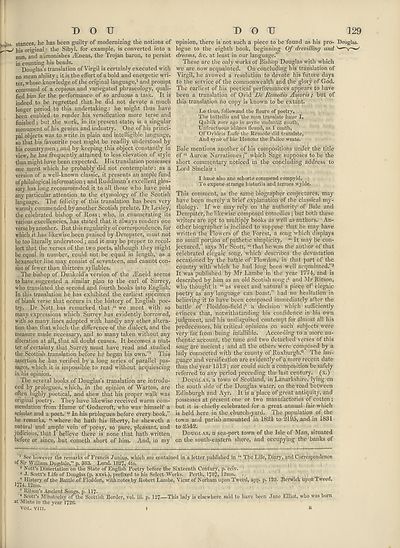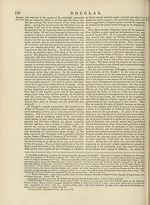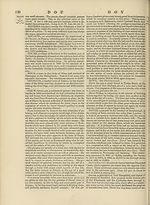Encyclopaedia Britannica > Volume 8, DIA-England
(139) Page 129
Download files
Complete book:
Individual page:
Thumbnail gallery: Grid view | List view

D O TJ
vias. stances, he has been guilty of modernizing the notions of
^ his original • the Sibyl, for example, is converted into a
nun, and a amonishes iEneas, the Trojan baron, to persist
in counting his beads.
Douglas’s translation of Virgil is certainly executed with
no mean ability; it is the effort of a bold and energetic wri¬
ter, whose knowledge of the original language,1 and prompt
command of a copious and variegated phraseology, quali¬
fied him for the performance of so arduous a task. It is
indeed to be regretted that he did not devote a much
longer period to this undertaking: he might thus have
been enabled to render his versification more terse and
finished; but the work, in its present state, is a singular
monument of his genius and industry. One of his princi¬
pal objects was to write in plain and intelligible language,
so that his favourite poet might be readily understood by
his countrymen; and by keeping this object constantly in
view, he has frequently attained to less elevation of style
than might have been expected. His translation possesses
one merit which he probably did not contemplate: as a
version of a well-known classic, it presents an ample fund
of philological information; and Ruddiman’s excellent glos¬
sary has long recommended it to all those who have paid
any particular attention to the etymology of the Scotish
language. The felicity of this translation has been very
warmly commended by another Scotish prelate, Dr Lesley,
the celebrated bishop of Ross; who, in enumerating its
various excellencies, has stated that it always renders one
verse by another. But this regularity of correspondence, for
which it has likewise been praised by Dempster, must not
be too literally understood ; and it may be proper to recol¬
lect that the verses of the two poets, although they might
be equal in number, could not be equal in length, as a
hexameter line may consist of seventeen, and cannot con¬
sist of fewer than thirteen syllables.
The bishop of Dunkeld’s version of the iEneid seems
to have suggested a similar plan to the earl of Surrey,
who translated the second and fourth books into English.
In this translation he has exhibited the earliest specimen
of blank verse that occurs in the history of English poe¬
try. Dr Nott has remarked that “ we meet with so
many expressions which Surrey has evidently borrowed,
with so many lines adopted with hardly any other altera¬
tion than that which the difference of the dialect, and the
measure made necessary, and so many taken without any
alteration at allv that all doubt ceases. It becomes a mat¬
ter of certainty that Surrey must have read and studied
the Scottish translation before he began his own.”2 This
assertion he has verified by a long series of parallel pas¬
sages, which it is impossible to read without acquiescing
in his opinion.
The several books of Douglas’s translation are introdu¬
ced by prologues, which, in the opinion of Warton, are
often highly poetical, and shew that his proper walk was
original poetry. They have likewise received warm com¬
mendation from Hume of Godscroft, who was himself a
scholar and a poet. “ In his prologues before every book,”
he remarks, “ where he hath his liberty, he sheweth a
natural and ample vein of poesy, so pure, pleasant, and
judicious, that I believe there is none that hath written
before or since, but cometh short of him. And, in my
D O V 129
opinion, there is not such a piece to be found as his pro- Douglas,
logue to the eighth book, beginning Of drevilling and
dreams, &c. at least in our language.”
These are the only works of Bishop Douglas with which
we are now acquainted. On concluding his translation of
Virgil, he avowed a resolution to devote his future days
to the service of the commonwealth and the glory of God.
The earliest of his poetical performances appears to have
been a translation of Ovid De Remedio Amoris; but of
this translation no copy is known to be extant.
Lo thus, followand the floure of poetry,
The battellis and the man translate haue I,
Quhilk zore ago in myne undantit zouth,
Unf'ructuous idilnes fleand, as I couth,
Of Ovideis Lute the Remede did translate,
And syne of hie Honour the Palice wrate.
Bale mentions another of his compositions under the title
of “ Aureae Narrationes;” which Sage supposes to be the
short commentary noticed in the concluding address to
Lord Sinclair:
I haue also ane schorte commend compyld,
To expone strange historiis and termes wylde.
This comment, as the same biographer conjectures, may
have been merely a brief explanation of the classical my¬
thology. If we may rely on the authority of Bale and
Dempster, he likewise composed comedies ; but both these
writers are apt to multiply books as well as authors. An¬
other biographer is inclined to suppose that he may have
written the Flowers of the Forest, a song which displays
no small portion of pathetic simplicity. “ It may be con¬
jectured,” says Mr Scott, “ that he was the author of that
celebrated elegaic song, which describes the devastation
occasioned by the battle of Flow don, in that part of the
country with which he had long been well acquainted.”3
It was published by Mr Lambe in the year 1774, and is
described by him as an old Scotish song;4 and Mr Ritson,
who thought it “ as sweet and natural a piece of elegaic
poetry as any language can boast,” had no hesitation in
believing it to have been composed immediately after the
battle of Floddon-field ;5 a decision which sufficiently
evinces that, notwithstanding his confidence in his own
judgment, and his undisguised contempt for almost all his
predecessors, his critical opinions on such subjects were
very far from being infallible. According to a more au¬
thentic account, the tune and two detached verses of this
song are ancient; and all the others were composed by a
lady connected with the county of Roxburgh.6 The lan¬
guage and versification are evidently of a more recent date
than the year 1513 ; nor could such a composition be safely
referred to any period preceding the last century, (x.)
Douglas, a town of Scotland, in Lanarkshire, lying on
the south side of the Douglas water, on the road between
Edinburgh and Ayr. It is a place of great antiquity, and
possesses at present one or two manufactories of cotton ;
but it is chiefly celebrated for a great annual fair which
is held here in the church-yard. The population of the
town and parish amounted in 1821 to 2195, and in 1831
to 2542.
Douglas, a sea-port town of the Isle of Man, situated
on the south-eastern shore, and occupying the banks of
1 See however the remarks of Francis Junius, which are contained in a letter published in “ The Life, Diary, and Correspondence
of Sir William Dugdale,” p. 383. Lond. 1827, 4to.
3 Nott’s Dissertation on the State of English Poetry before the Sixteenth Century, p. cciv.
3 J. Scott’s Life of Douglas (p. xxvi.), prefixed to his Select Works. Perth, 1787, 12mo.
4 History of the Battle of Floddon, with notes by Robert Lambe, Vicar of Norham upon Tweed, app. p. 129. Berwick upon Tweed,
1774, 12mo.
5 Ritson’s Ancient Songs, p. 117.
* Scott’s Minstrelsy of the Scottish Border, vol. iii. p. 127.—This lady is elsewhere said to have been Jane Elliot, who was born
at Minto in the year 1728.
VOL. VIII. I R
vias. stances, he has been guilty of modernizing the notions of
^ his original • the Sibyl, for example, is converted into a
nun, and a amonishes iEneas, the Trojan baron, to persist
in counting his beads.
Douglas’s translation of Virgil is certainly executed with
no mean ability; it is the effort of a bold and energetic wri¬
ter, whose knowledge of the original language,1 and prompt
command of a copious and variegated phraseology, quali¬
fied him for the performance of so arduous a task. It is
indeed to be regretted that he did not devote a much
longer period to this undertaking: he might thus have
been enabled to render his versification more terse and
finished; but the work, in its present state, is a singular
monument of his genius and industry. One of his princi¬
pal objects was to write in plain and intelligible language,
so that his favourite poet might be readily understood by
his countrymen; and by keeping this object constantly in
view, he has frequently attained to less elevation of style
than might have been expected. His translation possesses
one merit which he probably did not contemplate: as a
version of a well-known classic, it presents an ample fund
of philological information; and Ruddiman’s excellent glos¬
sary has long recommended it to all those who have paid
any particular attention to the etymology of the Scotish
language. The felicity of this translation has been very
warmly commended by another Scotish prelate, Dr Lesley,
the celebrated bishop of Ross; who, in enumerating its
various excellencies, has stated that it always renders one
verse by another. But this regularity of correspondence, for
which it has likewise been praised by Dempster, must not
be too literally understood ; and it may be proper to recol¬
lect that the verses of the two poets, although they might
be equal in number, could not be equal in length, as a
hexameter line may consist of seventeen, and cannot con¬
sist of fewer than thirteen syllables.
The bishop of Dunkeld’s version of the iEneid seems
to have suggested a similar plan to the earl of Surrey,
who translated the second and fourth books into English.
In this translation he has exhibited the earliest specimen
of blank verse that occurs in the history of English poe¬
try. Dr Nott has remarked that “ we meet with so
many expressions which Surrey has evidently borrowed,
with so many lines adopted with hardly any other altera¬
tion than that which the difference of the dialect, and the
measure made necessary, and so many taken without any
alteration at allv that all doubt ceases. It becomes a mat¬
ter of certainty that Surrey must have read and studied
the Scottish translation before he began his own.”2 This
assertion he has verified by a long series of parallel pas¬
sages, which it is impossible to read without acquiescing
in his opinion.
The several books of Douglas’s translation are introdu¬
ced by prologues, which, in the opinion of Warton, are
often highly poetical, and shew that his proper walk was
original poetry. They have likewise received warm com¬
mendation from Hume of Godscroft, who was himself a
scholar and a poet. “ In his prologues before every book,”
he remarks, “ where he hath his liberty, he sheweth a
natural and ample vein of poesy, so pure, pleasant, and
judicious, that I believe there is none that hath written
before or since, but cometh short of him. And, in my
D O V 129
opinion, there is not such a piece to be found as his pro- Douglas,
logue to the eighth book, beginning Of drevilling and
dreams, &c. at least in our language.”
These are the only works of Bishop Douglas with which
we are now acquainted. On concluding his translation of
Virgil, he avowed a resolution to devote his future days
to the service of the commonwealth and the glory of God.
The earliest of his poetical performances appears to have
been a translation of Ovid De Remedio Amoris; but of
this translation no copy is known to be extant.
Lo thus, followand the floure of poetry,
The battellis and the man translate haue I,
Quhilk zore ago in myne undantit zouth,
Unf'ructuous idilnes fleand, as I couth,
Of Ovideis Lute the Remede did translate,
And syne of hie Honour the Palice wrate.
Bale mentions another of his compositions under the title
of “ Aureae Narrationes;” which Sage supposes to be the
short commentary noticed in the concluding address to
Lord Sinclair:
I haue also ane schorte commend compyld,
To expone strange historiis and termes wylde.
This comment, as the same biographer conjectures, may
have been merely a brief explanation of the classical my¬
thology. If we may rely on the authority of Bale and
Dempster, he likewise composed comedies ; but both these
writers are apt to multiply books as well as authors. An¬
other biographer is inclined to suppose that he may have
written the Flowers of the Forest, a song which displays
no small portion of pathetic simplicity. “ It may be con¬
jectured,” says Mr Scott, “ that he was the author of that
celebrated elegaic song, which describes the devastation
occasioned by the battle of Flow don, in that part of the
country with which he had long been well acquainted.”3
It was published by Mr Lambe in the year 1774, and is
described by him as an old Scotish song;4 and Mr Ritson,
who thought it “ as sweet and natural a piece of elegaic
poetry as any language can boast,” had no hesitation in
believing it to have been composed immediately after the
battle of Floddon-field ;5 a decision which sufficiently
evinces that, notwithstanding his confidence in his own
judgment, and his undisguised contempt for almost all his
predecessors, his critical opinions on such subjects were
very far from being infallible. According to a more au¬
thentic account, the tune and two detached verses of this
song are ancient; and all the others were composed by a
lady connected with the county of Roxburgh.6 The lan¬
guage and versification are evidently of a more recent date
than the year 1513 ; nor could such a composition be safely
referred to any period preceding the last century, (x.)
Douglas, a town of Scotland, in Lanarkshire, lying on
the south side of the Douglas water, on the road between
Edinburgh and Ayr. It is a place of great antiquity, and
possesses at present one or two manufactories of cotton ;
but it is chiefly celebrated for a great annual fair which
is held here in the church-yard. The population of the
town and parish amounted in 1821 to 2195, and in 1831
to 2542.
Douglas, a sea-port town of the Isle of Man, situated
on the south-eastern shore, and occupying the banks of
1 See however the remarks of Francis Junius, which are contained in a letter published in “ The Life, Diary, and Correspondence
of Sir William Dugdale,” p. 383. Lond. 1827, 4to.
3 Nott’s Dissertation on the State of English Poetry before the Sixteenth Century, p. cciv.
3 J. Scott’s Life of Douglas (p. xxvi.), prefixed to his Select Works. Perth, 1787, 12mo.
4 History of the Battle of Floddon, with notes by Robert Lambe, Vicar of Norham upon Tweed, app. p. 129. Berwick upon Tweed,
1774, 12mo.
5 Ritson’s Ancient Songs, p. 117.
* Scott’s Minstrelsy of the Scottish Border, vol. iii. p. 127.—This lady is elsewhere said to have been Jane Elliot, who was born
at Minto in the year 1728.
VOL. VIII. I R
Set display mode to:
![]() Universal Viewer |
Universal Viewer | ![]() Mirador |
Large image | Transcription
Mirador |
Large image | Transcription
Images and transcriptions on this page, including medium image downloads, may be used under the Creative Commons Attribution 4.0 International Licence unless otherwise stated. ![]()
| Encyclopaedia Britannica > Encyclopaedia Britannica > Volume 8, DIA-England > (139) Page 129 |
|---|
| Permanent URL | https://digital.nls.uk/193324812 |
|---|
| Attribution and copyright: |
|
|---|
| Description | Ten editions of 'Encyclopaedia Britannica', issued from 1768-1903, in 231 volumes. Originally issued in 100 weekly parts (3 volumes) between 1768 and 1771 by publishers: Colin Macfarquhar and Andrew Bell (Edinburgh); editor: William Smellie: engraver: Andrew Bell. Expanded editions in the 19th century featured more volumes and contributions from leading experts in their fields. Managed and published in Edinburgh up to the 9th edition (25 volumes, from 1875-1889); the 10th edition (1902-1903) re-issued the 9th edition, with 11 supplementary volumes. |
|---|---|
| Additional NLS resources: |
|

